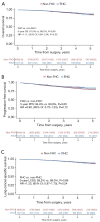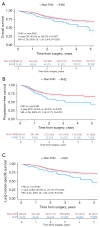Effect of family history of cancer on postoperative survival in patients with non-small cell lung cancer
- PMID: 39263018
- PMCID: PMC11384475
- DOI: 10.21037/tlcr-24-349
Effect of family history of cancer on postoperative survival in patients with non-small cell lung cancer
Abstract
Background: Family history of cancer (FHC) has been reported to increase mortality of non-small cell lung cancer, mainly comprised of lung adenocarcinoma (LUAD) and lung squamous cell carcinoma (LUSC). However, the impact of FHC on long-term survival remains controversial. This study aims to identify the impact of FHC on postoperative survival in LUAD and LUSC.
Methods: Patients underwent lung resection for LUAD or LUSC in West China Hospital from 2009 to 2021 were enrolled. The 5-year overall survival (OS), lung cancer-specific survival (LCSS) and progression-free survival (PFS) were compared between the patients with and without FHC. Multivariable Cox regression was also performed.
Results: A total of 6,253 patients were enrolled, including 5,685 LUAD and 568 LUSC. Altogether 18.9% (1,077/5,685) patients had FHC in LUAD, and 12.7% (72/568) patients had FHC in LUSC. In LUAD, the patients with FHC showed comparable survival compared with the patients without FHC regarding 5-year OS (87.9% vs. 86.5%, P=0.49), 5-year PFS (84.8% vs. 80.9%, P=0.06), and 5-year LCSS (89.2% vs. 88.0%, P=0.96). In LUSC, the patients with FHC had poorer survival compared with the patients without FHC according to 5-year OS (40.9% vs. 68.2%, P=0.007), 5-year PFS (42.3% vs. 66.2%, P=0.003), and 5-year LCSS (45.8% vs. 72.7%, P=0.003). Multivariate analyses indicated that FHC was an independent prognostic factor of OS, PFS, and LCSS in the patients with LUSC.
Conclusions: FHC was associated with a poor survival after lung resection in LUSC not LUAD patients. More attention should be paid in postoperative monitoring and treatment in LUSC patients with FHC.
Keywords: Family history of cancer (FHC); lung cancer; surgery; survival.
2024 Translational Lung Cancer Research. All rights reserved.
Conflict of interest statement
Conflicts of Interest: All authors have completed the ICMJE uniform disclosure form (available at https://tlcr.amegroups.com/article/view/10.21037/tlcr-24-349/coif). The authors have no conflicts of interest to declare.
Figures



References
-
- National Comprehensive Cancer Network. Non-small Cell Lung Cancer (Version 4.2024). Accessed April 15, 2024. Available online: https://www.nccn.org/professionals/physician_gls/pdf/nscl.pdf
LinkOut - more resources
Full Text Sources
